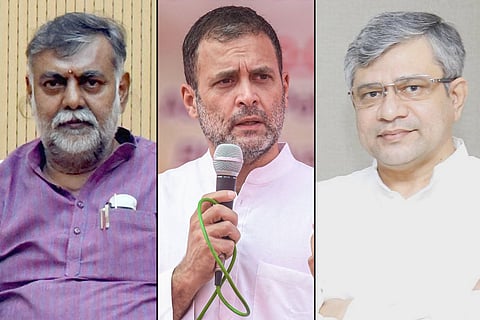

Day two of the investigations into the Pegasus ‘snoop’ list has revealed that the phone numbers of Wayanad MP Rahul Gandhi, political analyst Prashant Kishor and even Union IT Minister Ashwini Vaishnaw, who had just minutes ago dismissed the reports, have been found to be among the 50,000 phone numbers which are believed to have been targeted by the Israeli spyware Pegasus.
According to the report in The Wire, which is a part of the global media consortium reporting on the Pegasus Project, Rahul Gandhi’s phones appear to have been selected for targeting from mid-2018 to mid-2019. Since he no longer uses those phones, it cannot be established whether the hacking attempt was successful. In his statement to The Wire, Rahul said he had received suspicious WhatsApp messages earlier and hence changed numbers and phones “so as to make it a little harder for them.”
“Targeted surveillance of the type you describe whether in regard to me, other leaders of the opposition or indeed any law-abiding citizen of India is illegal and deplorable. If your information is correct, the scale and nature of surveillance you describe goes beyond an attack on the privacy of individuals. It is an attack on the democratic foundations of our country. It must be thoroughly investigated and those responsible be identified and punished,” Rahul Gandhi said in a statement to The Wire. The numbers of his two close aides — Alankar Sawai and Sachin Rao — also featured in the database of numbers possibly targeted by Pegasus.
According to The Wire, the numbers belonging to Union IT Minister Ashwini Vaishnaw and Minister of State Prahlad Patel also feature in the database. In fact, this development surfaced just hours after Minister Ashwini Vaishnaw dismissed the Pegasus news reports.
The phone numbers of VHP leader Pravin Togadia, Smriti Irani's former OSD and Vasundhara Raje Scindia's former personal secretary were also on the surveillance list, the report said.
The phone number of the nephew of West Bengal Chief Minister Mamata Banerjee, Trinamool MP Abhishek Banerjee was also selected as a potential target for surveillance, the report says.
The Wire also reports that Election Commissioner Ashok Lavasa was also put on the snooping list after he flagged a violation of election code of conduct by Prime Minister Narendra Modi before the 2019 Lok Sabha Elections. The Wire reported that the number used by the election commission officer in 2019 was on the surveillance list.
Others whose numbers were also on the list include Jagdeep Chokhar, the co-founder of the watchdog Association for Democratic Reforms; virologist Gagandeep Kang; Hari Menon, the India head of the Bill and Melinda Gates Foundation; as well as the woman staffer who accused former Chief Justice of India Ranjan Gogoi of sexual harassment.
These revelations are a part of an investigation conducted by Paris-based media non-profit organisation Forbidden Stories and rights group Amnesty International into a leaked list of more than 50,000 phone numbers from across the world that are believed to have been the target of surveillance through Pegasus software of Israeli surveillance company NSO Group.
NSO Group says it deals only with ‘vetted’ governments. NSO Group has issued a response saying that “there can be no factual basis to suggest that a use of the data somehow equates to surveillance.”
While the consortium has said that a phone number's presence in the data does not mean an attempt was made to hack the device, it believed the data indicated potential targets of NSO's government clients.
Pegasus infiltrates phones to vacuum up personal and location data and surreptitiously controls the smartphone's microphones and cameras. The programme is designed to bypass detection and mask its activity. NSO Group's methods to infect its victims have grown so sophisticated that researchers say it can now do so without any user interaction, the so-called 'zero-click' option. Once it gets into a particular phone, Pegasus can access passwords, contact lists, calendar events, text messages, and live voice calls from popular mobile messaging apps. It can even turn on the microphone and the camera and use the GPS function on the phone to track a target’s location and movements.